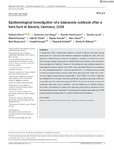Epidemiological investigation of a tularaemia outbreak after a hare hunt in Bavaria, Germany, 2018
Böhm, Stefanie
vom Berge, Katharina
Hierhammer, Daniela
Jacob, Daniela
Grunow, Roland
Riehm, Julia M.
Konrad, Regina
Dauer, Marc
Bouschery, Berit
Hossain, Hamid
Schichtl, Elisabeth
Böhmer, Merle M.
In November 2018, a tularaemia outbreak occurred in Bavaria, Germany, among participants of a hare hunt and butchery employees handling the hares. We con-ducted an epidemiological outbreak investigation, including a retrospective cohort study among hunting participants, to identify likely transmission routes and activi-ties associated with infection. Twelve of 41 participants were antibody- positive for Francisella (F.) tularensis (attack rate: 29%). Cases reported influenza- like symptoms (n= 11), lymphadenopathy (n= 1) and conjunctivitis (n= 1). Infection only occurred in those hunting participants present while hares were processed, while risk of infec-tion was highest when directly involved (RR = 10.0; 95%CI: 2.6–392). F. tularensiswas isolated from 1/4 hares. Only two individuals reported using some of the rec-ommended personal protective equipment (PPE). Occurrence of mainly non-specific symptoms, likely due to early treatment, was not indicative of a specific transmis-sion route. Transmissions via direct (skin/mucosa) contact and by inhalation of con-taminated aerosols seem plausible. Promoting and increasing appropriate use of PPE among people processing hares is crucial to prevent future outbreaks.

